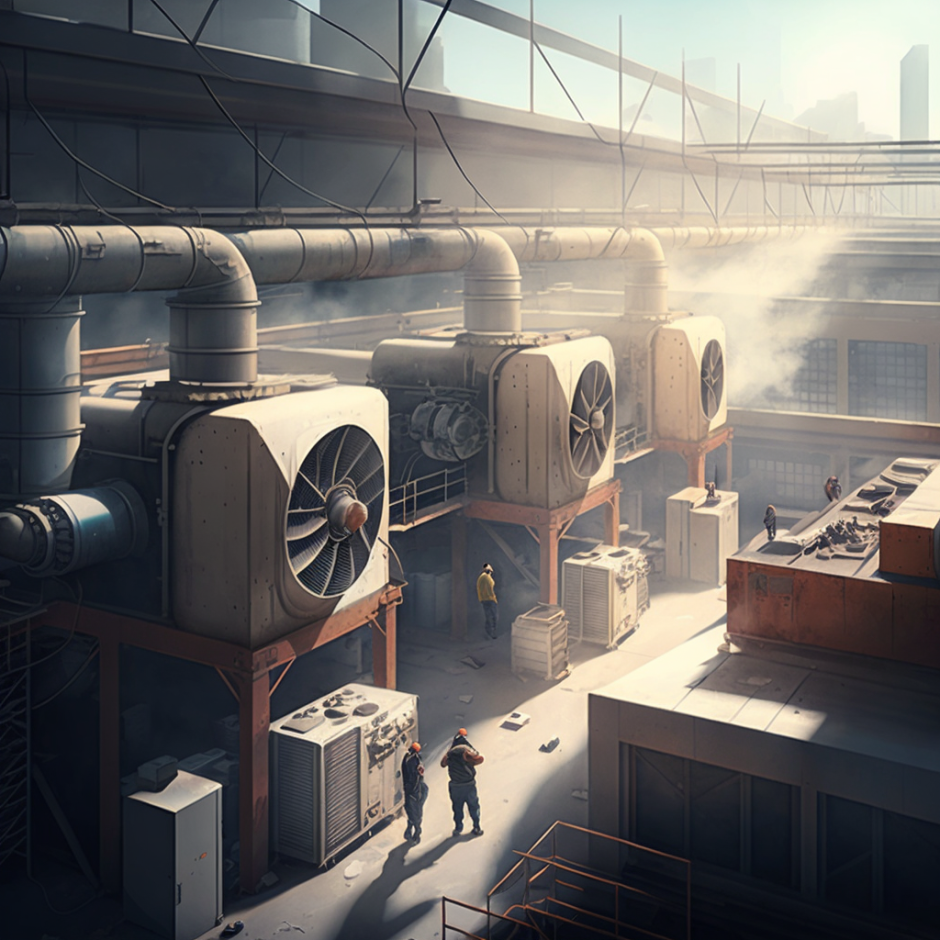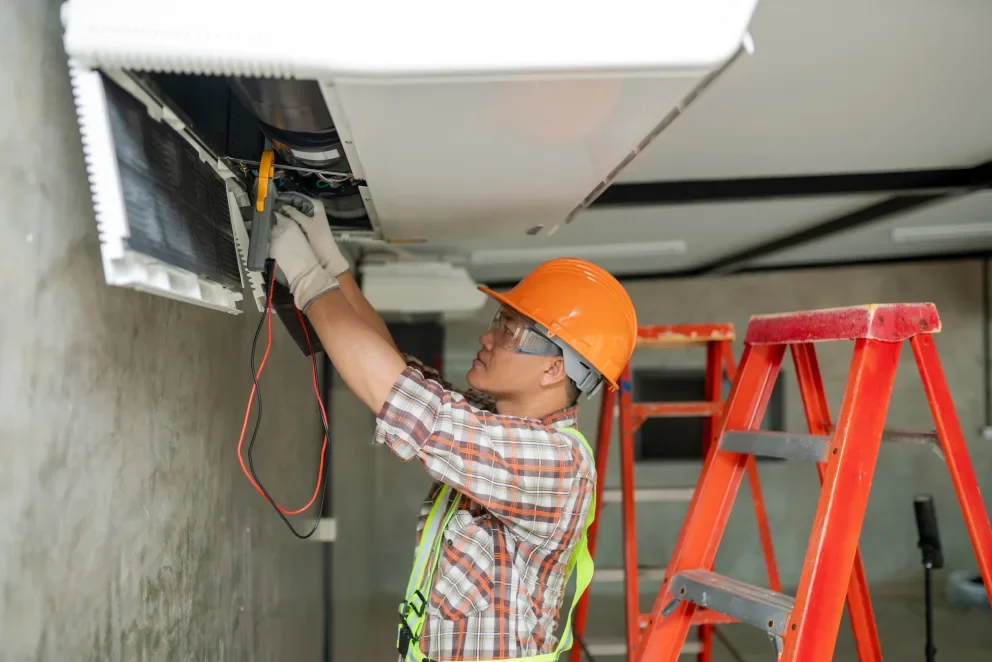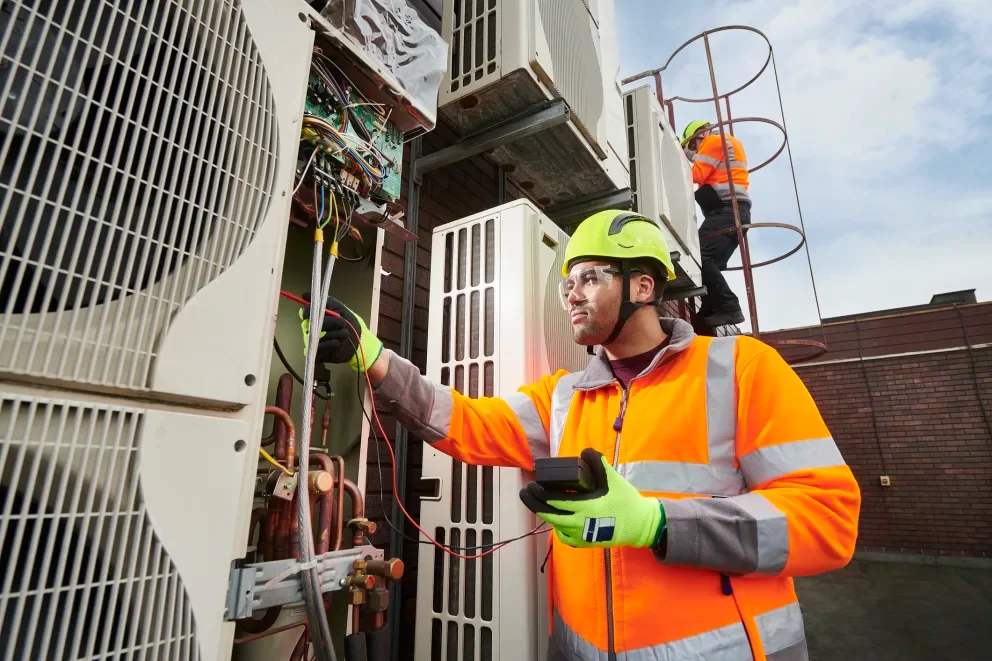What is Industrial HVAC?
Industrial HVAC (Heating, Ventilation, and Air Conditioning) is a specialized field of engineering that concentrates on the design, implementation, and maintenance of large-scale systems for industrial and commercial applications. Industrial HVAC systems are found in many different types of facilities such as factories, warehouses, office buildings, airports, hospitals, and shopping malls.
Industrial HVAC systems are typically more complex than residential systems due to their size and complexity. They may include multiple units that work in tandem to provide consistent temperatures throughout an entire building or facility. The main purpose of industrial HVAC system is to keep the air at a comfortable temperature while also controlling humidity levels to prevent mold growth and other hazards. In addition to providing comfort levels for workers or customers in the facility, industrial air conditioning can help reduce energy costs by efficiently heating or cooling areas as needed.
Industrial HVAC systems must be properly designed in order to maximize efficiency and cost effectiveness. A good design should factor in the size of the facility as well as its specific uses in order to customize a system that meets the demands of each individual space. For example, if a certain area requires colder temperatures than other parts of the building due to housing sensitive equipment or products then special care must be taken when designing an industrial air conditioning system for that particular area.
The components used within an industrial HVAC system should also be carefully selected based on their reliability and energy efficiency ratings as these will play a large role in determining how efficient the overall system is in terms of energy use energy conservation efforts such as LEED certification criteria.
It’s also important to understand how components interact with one another before making any purchasing decisions since poorly matched items can lead to inadequate performance and costly repairs over time. Proper installation of equipment along with regular maintenance will go a long way towards ensuring optimal performance throughout the life span of your industrial HVAC system.
What Industrial HVAC companies do?
Industrial HVAC companies provide services such as designing, installing, and maintaining heating, ventilation, and air conditioning systems for industrial and commercial applications. These companies specialize in creating systems tailored to the exact specifications of each environment in order to maximize efficiency and cost effectiveness.
Industrial HVAC companies often work with clients to determine their specific needs before developing a comprehensive system design that meets their criteria. Once these designs are approved, the company can then move forward with the installation process which typically involves selecting the appropriate components and integrating them into the space. This installation process can be quite extensive depending on the size and complexity of the project.
In addition to providing installation services, many industrial HVAC companies also offer preventive maintenance programs which are designed to keep systems running optimally over time by addressing small issues before they become more costly problems in the future. Many industrial HVAC companies also include engineering consulting services so they can advise their clients on energy saving methods or recommend upgrades when necessary.
These companies also employ highly skilled technicians who are trained in all aspects of industrial HVAC service including troubleshooting existing systems, performing repairs, conducting inspections, or helping clients develop custom control strategies. The overall goal of any good industrial HVAC service provider is to help its clients save money on operating costs by ensuring that all systems run at peak efficiency at all times.
What are the different kinds of Industrial HVAC companies?
There are many different kinds of Industrial HVAC companies that offer various services for industrial and commercial applications. These can range from small, family-owned businesses to large corporations.
One type of industrial HVAC company is the design-build organization which offers both design and installation services. Design-build organizations typically employ in-house engineers or architects who are capable of creating custom solutions tailored to the exact needs of a particular space. This type of company also employs its own installation teams who oversee the entire process from start to finish.
Another type of industrial HVAC company is proactive service providers which focus on preventive maintenance and inspections. These companies often have highly trained technicians who quickly respond to any issues that arise before they become costly problems in the future. Proactive service providers also provide consulting services so they can advise their clients on energy saving methods or recommend upgrades when necessary.
Additionally, some industrial HVAC companies specialize in specific technologies like geothermal heating and cooling systems, specialized air filtration systems, or high efficiency units like zonal climate control systems. Whatever kind of industrial HVAC service a client needs, there’s likely a provider out there who specializes in it.
What qualities are essential for a successful Industrial HVAC business owner?
Owning an industrial HVAC business requires a number of key qualities in order to be successful. First and foremost, the owner must have a thorough understanding of the industry and its standards. Knowing the terminology, regulations, and best practices for working with different types of systems is essential for helping keep projects moving forward efficiently and safely.
In addition to industry knowledge, a successful industrial HVAC business owner should also be able to develop strong relationships with clients. Industrial HVAC services often involve large investments so having the ability to clearly explain how a particular system will benefit them can help increase customer satisfaction and lead to repeat business opportunities.
Strong communication skills are also important for any industrial HVAC business owner since they are likely dealing with multiple contractors or employees at any given point in time. Having the ability to delegate tasks appropriately and provide clear instructions can help ensure that everyone involved is on the same page when it comes to project goals and timeline expectations.
Finally, financial prowess is essential for any business owner since they need to accurately predict future costs while still staying within budget constraints. Being able to effectively forecast future expenses while ensuring that all necessary components are included in quotes can give owners a competitive edge in the market.
What are the current trends in the industrial HVAC industry?
The industrial HVAC industry is constantly evolving due to advances in technology, energy efficient solutions, and varying customer needs. As such, there are several current trends that many businesses should be aware of.
One trend taking place in the industrial HVAC industry is the shift towards more energy efficient systems. This includes both building automation and controls upgrades as well as the installation of new systems such as geothermal and variable refrigerant flow technologies. By making these types of upgrades, businesses can reduce energy consumption and costs while still meeting their operational needs.
Industry-wide consolidation is another trend that has been gaining traction recently. With a number of large companies merging with or acquiring smaller firms, it’s becoming increasingly difficult for independent operators to compete within this competitive landscape. Companies will need to find innovative ways to remain competitive if they want to stay in business.
Finally, increased demand for virtual services is quickly becoming a norm within the industry. Many organizations now offer remote services such as virtual maintenance checks and troubleshooting assistance in order to reduce costs while still providing reliable service to clients throughout the world. Services like these are becoming increasingly commonplace in today’s market which could lead to some interesting opportunities for those willing to embrace this form of technology.
What revenue streams are the most profitable for industrial HVAC businesses today?
Industrial HVAC businesses have a variety of revenue streams to choose from, but the most profitable ones tend to be those that involve long-term contracts or recurring services.
For example, offering maintenance and repair services on a contract basis can provide predictable sources of income for an industrial HVAC business. This type of service includes periodic visits to inspect and maintain equipment, as well as responding quickly to any emergency repairs that may arise. The steady stream of revenue from contracts like these can help ensure that the business has enough cash flow to cover operational expenses while still turning a profit.
Another lucrative option is providing energy-efficiency upgrades. As customers become increasingly aware of how much they’re spending on energy costs in their facilities, many are increasingly interested in finding ways to reduce their usage and overall bills. By offering efficient system upgrades such as geothermal systems and variable refrigerant flow technologies, businesses can capture some of this demand and generate significant profits for their efforts.
Finally, industrial HVAC businesses can also generate additional revenue by selling parts and supplies directly to customers. Many consumers prefer buying products from trusted vendors rather than searching for them online so having a wide selection available could prove beneficial in this regard. Additionally, shops with technicians on staff who are knowledgeable about the best products for different systems could have an edge over competitors when it comes to attracting new clients.



